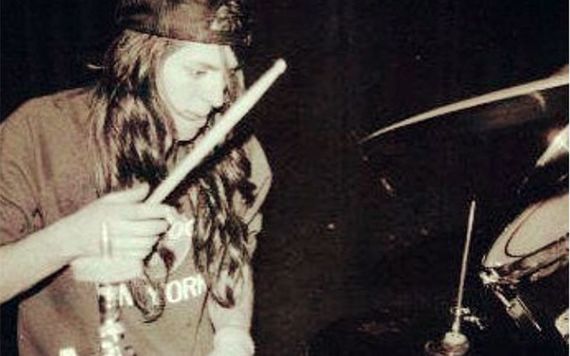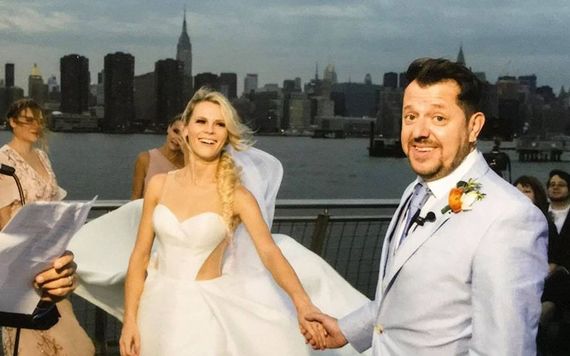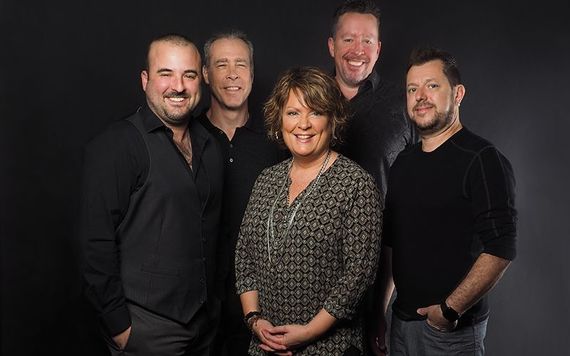Irish American musician Dave Barckow spent years punishing his body with alcohol and drugs, and after giving them up nearly 10 years ago now, he’s finally living life to the fullest. Here he talks about his sobriety journey.
Back when drinking and drugs dominated his life, it was nothing for Dave Barckow to polish off a bottle a vodka – at least a liter -- and smoke a good amount of dope every day. It wasn’t abnormal to throw in some cocaine and a few hefty shots of tequila to really get the party going.
Barckow, 46, is well known in Irish music circles, especially in his New York stomping ground, and has played drums and guitar with many local groups in addition to creating a successful solo career for himself. He’s been gigging since he was a kid who taught himself drums growing up in the Irish neighborhood of Woodside in Queens, and never missed a day of work even when in the throes of his addictions.
It was a wild ride, he remembers – getting stoned, drinking, playing music, meeting girls, partying like a rock star. Every. Single. Day.
In moments of clarity, Barckow was smart enough to know his story wouldn’t end well if he kept up such a reckless pace. It took decades for the penny to drop, but when it did, he embraced sobriety with the same fearless abandon that he used when he was drinking and drugging.
February of 2019 will mark 10 years of Barckow’s living life without alcohol; in August, he’ll be pot-free for the same amount of time.
“Life is so different now,” he told the Irish Voice during a recent wide-ranging interview. “I have the best life in the world that I’m totally grateful for. And if I can do it, so can anyone else who is struggling and wants to make a change.”
Read more: How I came home to the Catholic Church thanks to my kids
Detaching from habits cultivated since youth hasn’t been easy, he readily admits. Barckow was the youngest of four in his family – his maternal grandparents, the Macklins, were from Co. Galway – and showed a propensity for music from the age of six when he became obsessed with the drums. He soon was taking lessons.
“I took to them right away,” he remembers. “Playing music was the best thing in the world for me back then – it still is. If I didn’t have music in my life I would go insane.”
Young Dave was so good that he started gigging with local bands when he turned 12. He kept his grades up, sort of, and his mother didn’t disapprove.
“She believed that I would be a drummer. And she told me to just stay out of trouble and do what I had to do,” he says.
In high school – first at Monsignor McClancy and then, for senior year, St. Francis Prep which had better music classes – he was playing in metal bands around Woodside and Manhattan, and even knew a couple of his music teachers from the gigs. After graduation Barckow enrolled at Queens College, and something dawned on him a few days in.

Dave playing drums in the 1990s.
“One of the students just got up and left the classroom without asking permission. And I thought to myself, that was cool. You could just get up and leave,” he said.
Barckow stepped out of class and never looked back, his love of performing dominating all else. Opportunity really came knocking when his favorite local band at the time, a funk/hard rock group called White Trash, asked him to fill in on their national tour. The band had a million dollar record deal with Electra, and sponsorship from Jagermeister.
“They saw me in one of the clubs and some guy remembered me and that’s how it started,” he says.
The band spent two years traveling the country and headlining decent sized venues. Barckow remembers it as the time of his young life.
“What wasn’t to like – playing all over, doing drugs, drinking Jagermeister. It was a dream for a young guy,” he laughs.
With the advent of grunge White Trash eventually disbanded and Barckow returned to New York, joining an alternative band for a while and teaching himself guitar.
“I played guitar every single day for six months to learn,” he says.
“I made little set lists and became obsessed. I’d wake up, get really stoned, learn every song, go to the bars and get drunk, then play and sing, and do it all over again the next day.”
He soon met up with Irish musicians Dominic Cromie and Matt Mancuso and played in the band Raglan Road; Mancuso eventually joined Michael Flatley’s Lord of the Dance and Barckow became a regular in the local Irish music scene, never failing to show for a gig and often filling in as needed for others even though he was constantly drunk and/or high.
“If I book a gig I’m dependable. I’ll do it. If we don’t show up then deejays and karaoke shows get the gigs. Not that that’s bad, but live music is how we make our living. I’m always the guy that will stay till the end,” he says.
But… the “slow progression,” he says, of alcoholism and drug abuse was starting to become noticeable. Barckow had been drunk “a bunch of times” during his teen years; the free Jagermeister that flowed on tour with White Trash helped seal his love affair with booze.
“It was delicious,” Barckow remembers. “And that’s how it started. I was never one of those loud drunks. I never appeared to be falling down even though I drank a lethal amount of alcohol every day.
“And when you’re playing in bars, the drinks are for free. Whatever you want, in a pint glass.”
The routine was always the same -- wake up in the middle of the afternoon in his Woodside apartment, grab a large coffee at Dunkin’ Donuts, douse it with Baileys Irish Cream, head to the bar for a gig, return home with a bunch of other musicians for a late-night bender that would last till 6 a.m. Hangovers were never a problem “because the drinking never stopped,” Barckow says, “and I never had one.”
One evening after a gig at Maggie Mae’s in Queens, a friend of Barckow’s, a nurse practitioner, sounded the alarm bell. It was January 2008, and she knew he was in serious trouble.
“She held me by the shoulders and said, ‘You have to come and see me Monday.’ I didn’t know what was the matter of course. I was drunk, stinking of pot, but I remembered the conversation so I called her.”
She instructed Barckow to go to the “drunk tank” at Elmhurst Hospital where he was seen by doctors. The diagnosis wasn’t good. He had encephalopathy, also known as “wet brain,” a swelling and distortion that can result after prolonged abuse of alcohol. He also had a facial palsy that he didn’t notice, again down to the drug/alcohol usage.
“The doctors told me that they pulled homeless people off the streets in their seventies with what I had. And I was only 36,” he says. “My body couldn’t take nutrients anymore, but I felt great, like a million bucks. They did other tests and told me I had the heart of an old alcoholic, with a muscle that atrophied.
“But disease of alcoholism is also a disease of the ego, and by that time my ego was out of control. I looked in the mirror and I saw someone way better looking, but in reality what people saw was my stupid drunk face.”
He was warned to stop drinking immediately by his neurologist and was prescribed Librium to deal with the side effects of detoxing from years of alcohol abuse. He gave up the booze for about seven weeks and actually saved enough to buy a car – “that will give you some indication of what I was spending on booze, even when I was getting it for free most every night at my gigs,” Barckow says.
St. Patrick’s Day 2008 came, and with it a pint of Guinness. It wasn’t long before Barckow was right back where he started, drinking and smoking pot every day, but feeling the effects more because of his age and deteriorating physical health.
At the end of that year Barckow took some gigs in Amsterdam where he rang in 2009, drinking lots of vodka and back on the wrong path “with abandon,” he remembers.
“I remember New Year’s Eve and hearing everyone in the crowd saying I love you to each other, and people being happy. And I remember thinking that I was all alone, but that was fine. I was drunk and happy. My doctor once said I wouldn’t live to see 40 if I kept up the way I was going and I thought, well, 40 is fine. That’s plenty of years.”
After further gigs in Ireland and Spain Barckow returned to New York. His music friends summoned him to Paddy Reilly’s bar on Valentine’s Day for what he assumed was a celebration of his birthday the next day. He couldn’t have been more wrong.
“It was an intervention,” Barckow says. “It was basically, ‘You drink all the time, you sound like s***, what are you doing to yourself?’ Matt Mancuso was there. He had just gotten married and he told me I wouldn’t be alive to see his kids.”
There were a bunch of concerned friends at Paddy Reilly’s, and all read him the riot act. Barckow remembers being disgusted with them, but deep down he knew they were right. “Here’s how bad it got. On my birthday I had a new bag of coke. No one wanted to do it with me. You have to be a major a****** to have free drugs to offer, and no one wants to partake. The slide continued on for a couple of days,” he recalls.
The next day he took a girlfriend to see Rock of Ages on Broadway. He ordered a double vodka at the bar and looked in a nearby mirror.
The image coming back at Barckow finally shocked him to the core. He saw what looked like a withered old man.
“And that was the last time I had a drink. I couldn’t believe myself and how I looked, what I had done to myself,” he said.
He opted to go to a local Alcoholics Anonymous meeting. Eight years earlier he had been to one but left after 20 minutes “because I wasn’t ready. I thought I was way more awesome than these people. I could handle what was going on. I was so wrong.”
Barckow attended meetings every day, got a treatment book and made it a point to go to sessions no matter where in the country he was. He wholly committed himself to a new lifestyle, with AA’s steps as guiding tools.
“Everyone kept saying the same thing to me – life will get better if you commit to this, and when things are not so good, you will have to tools to do better.
“You know,” he continues, “I didn’t drink to become an alcoholic. I was born this way. Alcohol wasn’t something I was putting inside me to make me bad. It was something I was using to make myself normal.”
Barckow was well on his way to beating the booze. Pot was another story. He continued to smoke daily “and I never even thought about it,” he remembers. “I was so into AA, but after six months I was feeling really guilty about it.”
He told his sponsor he was still using pot and the reply was succinct: cut it out immediately because you can’t be high and sober at the same time.
Barckow then enrolled in an outpatient program which required daily urine tests to test for drugs. He found that kicking marijuana was much more difficult than saying goodbye to alcohol.
“With booze there were immediate benefits to stopping because I had the health problems that were related to that,” he says. “But stopping pot was honestly torture. I did it every day for 25 years.
“It’s funny, the majority of people in the outpatient program were court mandated because they had been caught with drugs or whatever. They were angry and didn’t want to be there, but I couldn’t get enough of it.”
Barckow stuck with the program and discovered something pretty remarkable – a previously undiscovered way of relating to music, one that was raw and pure.
“I would always lose myself in my music when I was stoned. I had only ever done that. But now, to really feel it again…it’s pretty incredible,” he says.
His life continued apace…gigging, attending AA meetings and maintaining a healthy lifestyle, but throat surgery beckoned in 2013 because of years of wear and tear from singing. Drugs and liquor didn’t help either.
“I actually remember crying. I thought my livelihood would be stripped from me. It was like a loss,” Barckow says.
AA helped him cope with his feelings, and then something totally unexpected happened. A few days after surgery Barckow was feeling fine and playing his instruments but couldn’t talk, let alone sing. He messaged an Irish-born singer who he vaguely knew through her sister, wondering if she’d be available to sing while his voice recovered.
Louise Barry accepted the offer. Four years later she also accepted his proposal and became his wife.
Barckow shakes his head and laughs. Getting married was never on the radar, but Louise, originally from Dublin, was a real keeper.
“I’m truly the luckiest guy in the world. That I got so lucky to meet Louise…it’s indescribable,” he says.
Their first gigs went great, he remembers. Louise, a singer from an early age who trained in Dublin and London, brought new energy to Barckow’s music, and eventually his life. It took a while before their relationship turned romantic, though.
In 2016 they relocated to Las Vegas, where business was especially good, but New York was where Barckow was rooted and it wasn’t long before they moved back. During the journey they discovered their friendship was blossoming into love.
One Christmas Louise cooked the big meal for Barckow’s family in Queens. It was sumptuous, he says, and he felt something he never could have experienced before – true love. Louise was The One.
“I remember writing her parents an email that night and telling them what Louise did, and how amazing she was,” Barckow said.
A few months later, Barckow used the “M” word with one of his friends in the band helmed by the renowned All-Ireland fiddle champ Eileen Ivers, who Barckow has played with for years.
“I said I wanted to get married, and he said to go for it and not be afraid. And that’s what I did,” Barckow says.
They had two big wedding celebrations in 2017, one in New York and one in Dublin, filled with friends and plenty of music. Dave Barckow had finally settled down.

Louise Barry and Dave Barckow’s New York wedding in 2017.
“Honestly, sometimes I’m changing my strings before a gig and I get choked up. I can’t believe how lucky I am,” he says.
He and Louise play together as the Diddley Idols at least four nights a week. They also work corporate gigs once a month throughout the U.S., and are employed by the Ri Ra Pub in Las Vegas. Throw in weddings, Barckow’s work with Ivers and other happenings, and there’s never time for a dull moment.

Eileen Ivers and her band – Matt Mancuso, Lindsey Horner, Buddy Connolly and Dave Barckow.
Many will know Barckow’s work in 2018 thanks to his posting of a song a day on his website and social media feeds. Each day he offers a new tune, Irish or otherwise, sometimes acoustic, sometimes joined by Louise or other musician friends like Mancuso. It’s a lot of work but really a labor of love for Barckow, who says he’s “finally living the life I was meant to live.”
Alcoholics Anonymous remains a huge part of his existence. Social media has made the anonymous part more difficult to maintain, and Barckow says he’s sharing his story in an effort to help others who may feel they have nowhere to turn, especially with the start of New Year beckoning.
“I don’t mean to sound like I’m selling AA, but it’s worked for me. I’ve never seen anyone who totally commits to the program that it doesn’t work for, but you’ve just got to put in the work,” he says.
He’s been to meetings in about 40 states and 150 different cities. On the rare days he can’t make it, he thinks about the steps he’s learned and what he needs to do to live a positive day.
“Life for me is easier when I go and make the commitment,” he says. “One of the ways I know it’s working is this: If I see a drunk person, which I often do, I think to myself that I am lucky and blessed at this point in my life. But if I was to think, ‘That person is such an a****** and I’m so awesome,’ then the program isn’t working.”
Barckow is the first to admit that temptation remains. “For sure. There will never be a breathing moment that I don’t want to smoke pot,” he confesses. “But if I do then I’ve got to give up every good thing in my life. And I’m not going to do that.”
The scene has also changed back from the rough and ready days when Barckow would drink anything and everything, “even vodka out of a paper bag,” he laughs.
“Nowadays, everyone is worried about their flavored cocktails, the alcohol content, dudes with umbrellas in their drinks sitting there sipping. I wouldn’t be able to hang with that.
“Though one day I did see a poster for coffee flavored tequila. I love coffee, and I love tequila. And then I’m imagining myself…I’ve already ordered it, and pot, and coke, and then I just laughed, because I’m not that person anymore.”
* If you have been affected by this story and wish to reach out for help please contact the US Addiction Services, AA or the AA in Ireland.
Read more: From rock star to wreck - My life or death battle with addiction




Comments